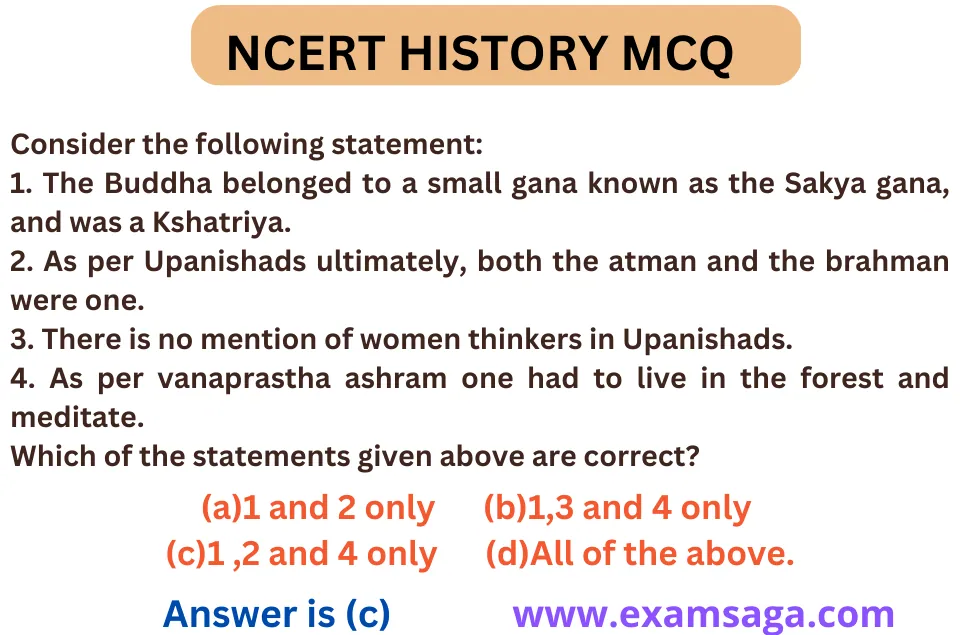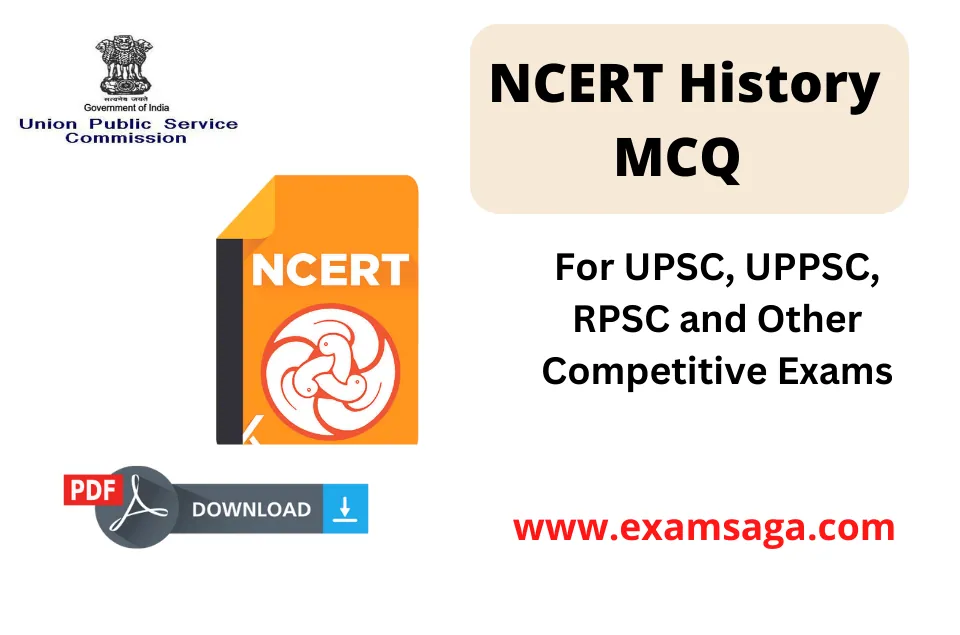NCERT History MCQ for UPSC can be useful for UPSC preparation as they provide a comprehensive overview of Indian history, from ancient to modern times.NCERT history textbooks can be very helpful for UPSC exam preparation for several reasons:
- Comprehensive coverage: NCERT textbooks cover a wide range of topics and themes related to Indian history, from ancient to modern times. They provide a comprehensive overview of Indian history, which is essential for UPSC exam preparation.
- Clarity and simplicity: NCERT textbooks are written in clear and simple language, which makes it easier for students to understand complex historical events and concepts. This is especially helpful for those who are new to the subject of history.
- Authenticity and reliability: NCERT textbooks are written by experts and are based on authentic historical sources. They are considered to be reliable and accurate sources of information, which is important for UPSC exam preparation.
- Foundation building: NCERT history textbooks provide a solid foundation for further reading and research. They help students develop a deep understanding of historical events and their significance, which is essential for answering UPSC exam questions.
- Focus on key concepts and themes: NCERT history textbooks focus on key concepts and themes that are important for understanding Indian history. This helps students identify important areas to focus on for UPSC exam preparation.
Overall, NCERT History MCQ for UPSC are an important resource for UPSC exam preparation. However, they should be used in conjunction with other books and materials, as well as current events and developments, to provide a well-rounded understanding of Indian history and its relevance to the present day.
NCERT History MCQ for UPSC
NCERT History MCQ for UPSC : Here are some examples of NCERT History MCQ for UPSC that may be useful for UPSC UPPSC, RPSC and Other Competitive preparation:
Who among the following was the first emperor of the Maurya dynasty?
- a. Bindusara
- b.Chandragupta Maurya
- c. Ashoka
- d. Samudragupta
Answer: b. Chandragupta Maurya
Which of the following rivers is not part of the Indus river system?
- a. Sutlej
- b. Jhelum
- c. Yamuna
- d. Chenab
Answer: c. Yamuna
The Vedic period is divided into how many parts?
- a. One
- b. Two
- c. Three
- d. Four
Answer: c. Three
Which of the following was not one of the major religions that originated in India?
- a. Hinduism
- b. Jainism
- c. Buddhism
- d. Christianity
Answer: d. Christianity
Who among the following was the first Indian ruler to issue coins with his own image?
- a. Chandragupta Maurya
- b. Ashoka
- c. Harsha
- d. Samudragupta
Answer: a. Chandragupta Maurya
Who among the following is considered the founder of Buddhism?
- a. Mahavira
- b. Gautama Buddha
- c. Adi Shankara
- d. Ramanuja
Answer: b. Gautama Buddha
Which of the following is not one of the Vedas?
- a. Rigveda
- b. Yajurveda
- c. Samaveda
- d. Atharvaveda
Answer: d. Atharvaveda
Who among the following was the author of the Arthashastra?
- a. Kautilya
- b. Ashoka
- c. Harsha
- d. Samudragupta
Answer: a. Kautilya
Who among the following was the last ruler of the Maurya dynasty?
- a. Bindusara
- b. Chandragupta Maurya
- c. Ashoka
- d. Brihadratha
Answer: d. Brihadratha

Which of the following is not one of the Four Noble Truths of Buddhism?
- a. All life is suffering.
- b. The cause of suffering is desire.
- c. The end of suffering is possible.
- d. The self is eternal and unchanging.
Answer: d. The self is eternal and unchanging.
Who among the following was the founder of the Gupta dynasty?
- a. Samudragupta
- b. Chandragupta II
- c. Skandagupta
- d. Kumaragupta I
Answer: b. Chandragupta II
Who among the following was the first ruler to issue gold coins in India?
- a. Samudragupta
- b. Chandragupta II
- c. Skandagupta
- d. Kumaragupta I
Answer: a. Samudragupta
The Harappan civilization was spread over which of the following present-day countries?
- a. India and Nepal
- b. India and Pakistan
- c. India and Bangladesh
- d. India and Sri Lanka
Answer: b. India and Pakistan
Which of the following is the oldest Veda?
- a. Rigveda
- b. Yajurveda
- c. Samaveda
- d. Atharvaveda
Answer: a. Rigveda
UPSC Previous Year Question Paper Download
Important NCERT History One Liner for UPSC
NCERT History MCQ for UPSC:Here are 100 one-liners on history from NCERT that may be useful for UPSC preparation:
- The Indus Valley Civilization was one of the earliest urban civilizations in the world.
- The Aryans were a nomadic pastoral community that migrated to India around 1500 BCE.
- The Maurya dynasty was founded by Chandragupta Maurya in 321 BCE.
- Ashoka was one of the greatest rulers of the Maurya dynasty.
- The Gupta dynasty is known for its cultural achievements and the Golden Age of India.
- The Delhi Sultanate was established by Muslim invaders in the 13th century.
- The Vijayanagara Empire was founded in the 14th century in South India.
- The Mughal Empire was established by Babur in 1526.
- Akbar was one of the greatest rulers of the Mughal Empire.
- The Maratha Empire was founded by Shivaji in the 17th century.
- The British East India Company established its first trading post in India in Surat in 1608.
- The Battle of Plassey in 1757 marked the beginning of British rule in India.
- The Indian National Congress was founded in 1885.
- Gandhi led the Indian freedom struggle through non-violent civil disobedience.
- India gained independence from British rule in 1947.
- The Constitution of India was adopted in 1950.
- The Green Revolution in the 1960s led to a significant increase in agricultural productivity.
- The Emergency was declared in India from 1975 to 1977.
- Rajiv Gandhi was assassinated in 1991.
- The liberalization of the Indian economy began in 1991.
- India conducted its first nuclear test in 1974.
- The Kargil War between India and Pakistan was fought in 1999.
- The National Rural Employment Guarantee Act was passed in 2005.
- The Right to Information Act was passed in 2005.
- The Goods and Services Tax was implemented in 2017.
- The Ayushman Bharat scheme was launched in 2018.
- The Citizenship Amendment Act was passed in 2019.
- The abrogation of Article 370 in Jammu and Kashmir took place in 2019.
- The Citizenship Amendment Act sparked protests across the country in 2019-2020.
- The COVID-19 pandemic had a significant impact on India in 2020.
- The Farm Bills passed in 2020 led to widespread protests by farmers.
- The Indian government banned several Chinese apps in 2020.
- India-China tensions escalated in 2020.
- The Indian economy contracted in 2020 due to the COVID-19 pandemic.
- The National Education Policy was approved in 2020.
- The Indian government launched the Atmanirbhar Bharat Abhiyan in 2020.
- India conducted a successful test of the BrahMos missile in 2020.
- The India-China border standoff continued in 2021.
- India launched its COVID-19 vaccination drive in 2021.
- The Indian government passed the controversial Farm Laws in 2021.
- The Indian government approved a plan to build a new parliament building in 2021.
- India launched a massive infrastructure development plan called the National Infrastructure Pipeline in 2021.
- India approved a new drone policy in 2021.
- India celebrated the 75th anniversary of its independence in 2021.
- The Revolt of 1857 was a significant event in Indian history that marked the beginning of the Indian independence movement.
- The Indian National Congress was formed in 1885 with the aim of achieving self-government for India.
- The partition of Bengal in 1905 was a major political event that sparked protests and boycotts.
- Mahatma Gandhi was the leader of the Indian independence movement and a champion of non-violent civil disobedience.
- The Non-Cooperation Movement launched by Gandhi in 1920 was a significant step towards India’s independence.
- The Salt March in 1930 was a major civil disobedience campaign against British salt taxes.
- The Quit India Movement launched by Gandhi in 1942 was a powerful mass movement for India’s independence.
- The Indian National Army (INA) was formed by Subhash Chandra Bose during World War II to fight for India’s independence.
- The partition of India in 1947 led to the creation of India and Pakistan and was accompanied by large-scale violence and displacement.
- The Indian Constitution was adopted in 1950 and is the supreme law of the land.
- The Green Revolution was a significant period of agricultural development in India in the 1960s and 1970s.
- The Emergency declared by Prime Minister Indira Gandhi in 1975 was a period of authoritarian rule and repression.
- The assassination of Prime Minister Indira Gandhi in 1984 led to widespread riots and violence.
- The liberalization of the Indian economy in 1991 marked a significant shift towards market-oriented policies.
- The Kargil War in 1999 was a conflict between India and Pakistan over the disputed region of Kashmir.
- The Right to Information Act passed in 2005 was a significant step towards transparency and accountability in government.
